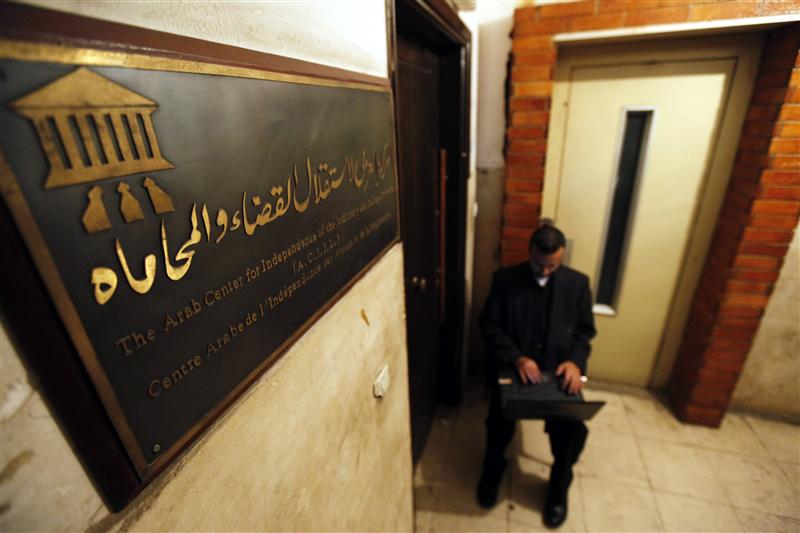Latest NEWS
- Aswat Masriya, the last word
- Roundup of Egypt's press headlines on March 15, 2017
- Roundup of Egypt's press headlines on March 14, 2017
- Former Egyptian President Hosni Mubarak to be released: lawyer
- Roundup of Egypt's press headlines on March 13, 2017
- Egypt's capital set to grow by half a million in 2017
- Egypt's wheat reserves to double with start of harvest -supply min
- Roundup of Egypt's press headlines on March 12, 2017
Independent rights group to register under controversial NGO law

An Egyptian human rights worker uses a laptop computer at the entrance of the office of an non-governmental organization in Cairo December 31, 2011. REUTERS/Mohamed Abd El-Ghany
By Rana Muhammad Taha
CAIRO, Dec 21 (Aswat Masriya) – The Cairo-based Egyptian Initiative for Personal Rights (EIPR) announced on Sunday its intention to register under the law governing non-governmental organisations in Egypt, despite remaining critical of the said law.
“Despite its rejection of the restrictions placed by the flawed 2002 NGO law, the imitative has decided to continue its independent struggle for right through registering its activities under the said law,” said the EIPR, which is currently registered as a firm. It added in a statement that it will continue working on revoking the NGO law and replacing it with “a democratic law to govern civil action.”
The ministry of social solidarity urged on July 18 all domestic and international NGOs operating within Egypt to register under Law 84/2002, which governs the activities of NGOs, before September 2. The deadline was later extended, to become November 10.
The law has widely been condemned by civil society organisations for granting the government control over NGOs.
Some civil society organisations operating in Egypt are registered as law firms or nonprofit companies to escape registration under the law in question.
Khaled Mansour, EIPR executive director, told Aswat Masriya the initiative has repeatedly contacted the government to enquire whether the NGO law applies to its activities.
“We have not received any official correspondence telling us the law applies to our activities,” Mansour said during a phone interview on Sunday. “We have nevertheless decided to put a limit to this shadow boxing … and to register.”
Mansour said that the EIPR will remain operating in its current form, as a registered firm, until it receives a response from the government regarding its registration as an NGO. The initiative has been active since its establishment in 2002.
“We will remain working on the same topics until they [the government] shut us down, which they can,” Mansour said.
The initiative vowed in its statement that it will pursue its job in monitoring “violations at police stations and prisons”, as well as other criminal justice facilities. The EIPR added that it will monitor state policies concerning social and economic justice as well as Egypt’s “international commitments” in several fields.
Mansour said that the initiative might face difficulty in raising funds after registering under the NGO law. He said that while the law stipulates that the government responds to the NGOs’ requests to raise funds within 60 days, in reality “the process could sometimes drag on for over a year.”
“Funding for NGOs registered under the law gets delayed for months, and sometimes for years,” Mansour said, adding that this “throttles” the activities of NGOs and might force them to reduce their staff.
The EIPR, like most other independent NGOs, currently relies in its funding on international endowment foundations, international human rights associations and some governments, Mansour said.
“It is up to the government to decide how our sources of funding might be affected by our registration under the NGO law,” he said, adding that the EIPR will seek domestic funding “as much as possible” after registering.
President Abdel Fattah al-Sisi amended in September Article 78 of the Penal Code in a manner which makes defendants accused of receiving foreign funds with the purpose of "harming the state" subject to being sentenced to life in prison or death.
“This amendment terrorises those who work in civil society organisations,” Mansour said.
He pointed out that civil society organisations are already being “harassed” with raids and imprisonments.
A Cairo Misdemeanour court sentenced on October 26 EIPR’s transitional justice officer and 22 others charged with violating the protest law to three years in prison.
Human rights defender Yara Sallam was reportedly arrested with her cousin while buying water from a kiosk in Cairo's Heliopolis neighbourhood, where the June 21 protest was held. The defendants were sentenced to prison for participating in the said protest.
Sallam remained in detention and faced official charges despite the release of her cousin the next day, which causes human rights watchdog Amnesty International to believe that she is being persecuted for her activism.
The controversial NGO law gives the government the power to shut down NGOs, freeze their assets, confiscate their property, block their funding or deny their requests to be affiliated with international organisations. Under this law, independent groups which practice unauthorised activities can receive a penalty of up to one year in prison.
International watchdog Human Rights Watch said in a statement on November 4 that a number of high-profile human rights defenders have fled the country in reaction to the government's keenness to pursue Law 84/2002. It added that some of the activists said they have been warned to register under the law, while others were "threatened with physical violence."
The Cairo Institute for Human Rights Studies (CIHRS) announced on December 9 the relocation of its programmes outside Egypt, citing threats to human rights and civil society organisations.
Relocation was paticularly triggered by the "expiration of the deadline set by the Ministry of Social Solidarity for 'unregistered entities' to register under a draconian associations law, ... and the deterioration of human rights to a level unprecedented in Egypt’s modern history."










